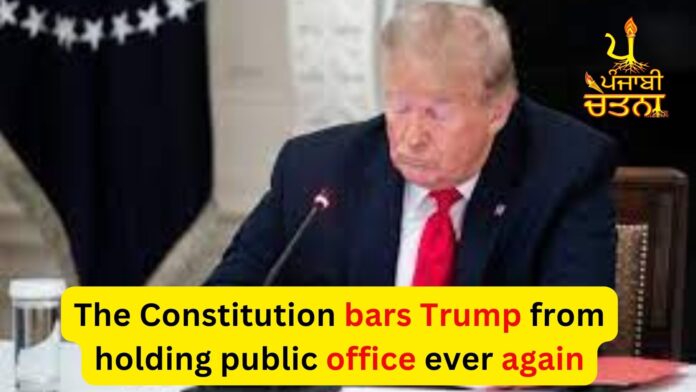While certain individuals on the right may view accountability for the Jan. 6 Capitol riot as merely another partisan disagreement, two prominent conservative legal scholars have presented an argument that the Constitution disqualifies former President Trump from holding public office.
Recently, law professors William Baude from the University of Chicago and Michael Stokes Paulsen from the University of St. Thomas, both members of the conservative Federalist Society, articulated in a law review article that Trump is constitutionally prohibited from serving in public office due to Section Three of the 14th Amendment.
Section Three, also known as the Disqualification Clause, prohibits any government officer who takes an oath to defend the Constitution and subsequently engages in or aids an insurrection against the United States from holding office. Only a two-thirds majority vote in both houses of Congress can remove this disqualification.
It should not come as a surprise that Trump falls within the standard set by this provision. All three branches of the government have recognized the attack on the Capitol as an insurrection. Multiple federal judges, bipartisan majorities in the House and Senate, as well as the bipartisan Jan. 6 House select committee, have all attributed Trump as the central cause of the riot.
Baude and Paulsen highlight that Section Three does not require a prior criminal conviction as a prerequisite for disqualification to apply. Trump’s indictment by special counsel Jack Smith for election-related crimes further strengthens the case for his constitutional disqualification. These charges encompass conspiracy to obstruct an official proceeding, obstruction of and attempt to obstruct an official proceeding, and conspiracy against rights by attempting to suppress individuals’ right to vote through intimidation.
While Section Three’s full legal ramifications may not have been fully recognized or enforced, Baude and Paulsen argue that it is a self-executing provision within the Constitution. They contend that any official, at the state or federal level, responsible for evaluating qualifications should enforce it without requiring additional action from Congress. Notably, a precedent was established last year when three New Mexico residents, represented by the organization Citizens for Responsibility and Ethics in Washington, successfully utilized Section Three to remove an elected official from office due to their involvement in the insurrection.
The court ruling in that case affirmed that disqualifying officials under Section Three does not infringe upon the First Amendment right to protest and rejected attempts to equate the events of Jan. 6 with Black Lives Matter protests.
Baude and Paulsen clarify that Section Three supersedes previous constitutional rules, including the free speech principles of the First Amendment. They emphasize its broad applicability, encompassing various acts against the constitutional order and extending to diverse former offices, including the presidency. They specifically state that Section Three disqualifies former President Donald Trump and potentially others who participated in the attempted overthrow of the 2020 presidential election.
Enforcing the Disqualification Clause against officials who violated their oath to preserve and defend the Constitution is an act of patriotism, devoid of partisanship, irrespective of the president’s political affiliation. As Baude and Paulsen aptly assert, officials must uphold the Constitution because it is the law, and Section Three already possesses legal force.
The Disqualification Clause has already been effectively employed to ensure accountability for the insurrection, and it will continue to serve as a deterrent, preventing Trump and other individuals from assuming public office in the foreseeable future.

































